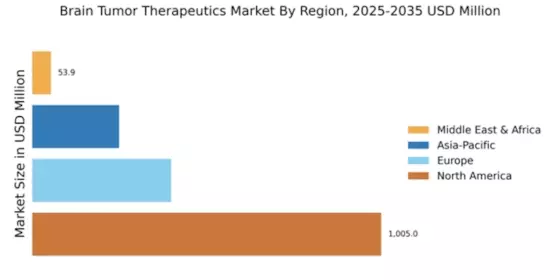Rising Incidence of Brain Tumors
The increasing prevalence of brain tumors globally is a primary driver of the Global Brain Tumor Therapeutic Market Industry. According to health statistics, the incidence of brain tumors has been on the rise, with estimates suggesting that approximately 700,000 individuals are living with a primary brain tumor in the United States alone. This growing patient population necessitates the development and availability of effective therapeutic options, thereby expanding the market. As awareness and diagnostic capabilities improve, more cases are likely to be identified, further propelling the demand for innovative treatments in the Global Brain Tumor Therapeutic Market Industry.
Advancements in Treatment Modalities
Innovations in treatment modalities, including targeted therapies and immunotherapies, are significantly influencing the Global Brain Tumor Therapeutic Market Industry. Recent developments in precision medicine have led to more personalized treatment approaches, enhancing efficacy and reducing side effects. For instance, the introduction of CAR T-cell therapy has shown promise in treating certain types of brain tumors. These advancements not only improve patient outcomes but also stimulate market growth, as healthcare providers seek to adopt the latest therapies. The Global Brain Tumor Therapeutic Market Industry is expected to reach 1.71 USD Billion in 2024, reflecting the impact of these advancements.
Increasing Awareness and Early Diagnosis
Heightened awareness regarding brain tumors and the importance of early diagnosis is contributing to the growth of the Global Brain Tumor Therapeutic Market Industry. Educational campaigns and initiatives by health organizations have improved public knowledge about symptoms and risk factors associated with brain tumors. This increased awareness leads to earlier detection, which is crucial for effective treatment. As more individuals seek medical attention promptly, the demand for therapeutic interventions rises. Consequently, this trend is likely to enhance the market dynamics, as the Global Brain Tumor Therapeutic Market Industry adapts to meet the needs of a more informed patient population.
Aging Population and Associated Health Risks
The aging global population is a significant factor influencing the Global Brain Tumor Therapeutic Market Industry. As individuals age, the risk of developing brain tumors increases, leading to a higher demand for therapeutic solutions. Demographic trends indicate that by 2030, the number of people aged 65 and older will reach approximately 1.4 billion worldwide. This demographic shift necessitates a focus on age-related health issues, including brain tumors. Consequently, the Global Brain Tumor Therapeutic Market Industry is poised for growth as healthcare systems adapt to the needs of an aging population, potentially leading to a compound annual growth rate of 5.85% from 2025 to 2035.
Growing Investment in Research and Development
The surge in investment directed towards research and development in oncology is a crucial driver for the Global Brain Tumor Therapeutic Market Industry. Governments and private entities are increasingly funding initiatives aimed at understanding brain tumor biology and developing novel therapies. For example, the National Institutes of Health has allocated substantial resources to brain tumor research, fostering innovation in treatment options. This influx of funding is likely to accelerate the discovery of new therapeutic agents, thereby expanding the market. Projections indicate that the Global Brain Tumor Therapeutic Market Industry could reach 3.2 USD Billion by 2035, driven by these research advancements.

















